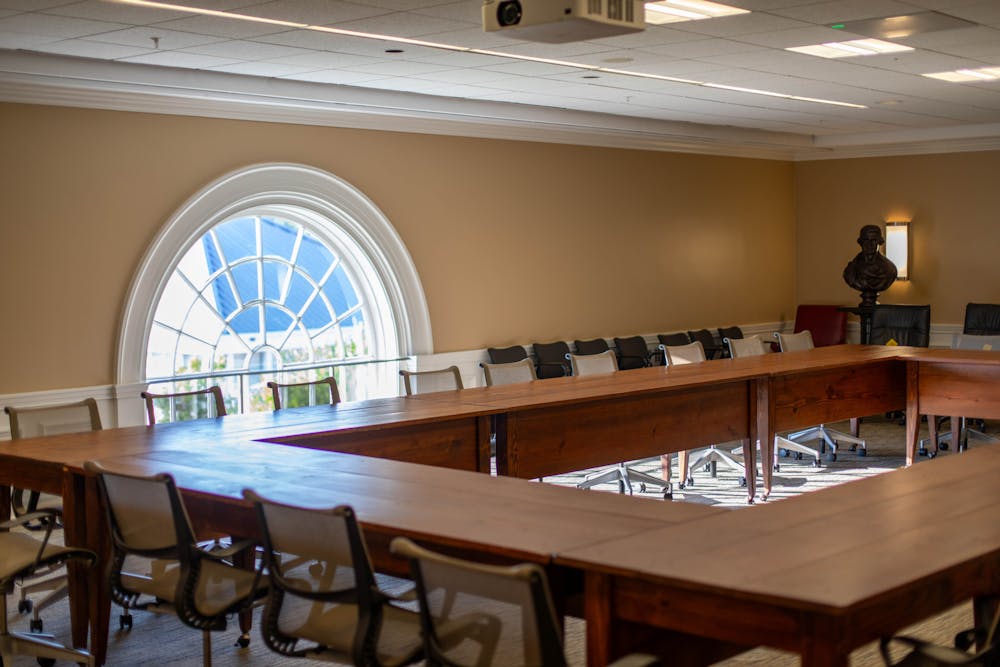The Honor Committee met to brainstorm proactive academic integrity initiatives to help students determine what activities are and are not Honor offenses, and considered the community service sanction’s viability during their meeting Sunday.
The meeting did not meet quorum with only 16 out of 29 members present, meaning the Committee could not vote on matters concerning the constitution or bylaws. All other meetings this semester have met quorum.
The Committee has previously discussed how to take proactive initiatives to address potential sources of academic integrity concerns, particularly in the context of generative AI. In a previous meeting, Committee members considered the idea of outlining ways in which AI usage can be “honorable” for students, such as summarizing readings.
At Sunday’s meeting, Committee members expanded upon this discussion to encompass a wider range of academic activities outside of the use of AI, such as writing assignments and exams at the University. The Committee discussed partnerships with University organizations that would help promote academic integrity and also build partnerships between the Committee and University groups.
Hamza Aziz, chair of the Committee and fourth-year College student, raised the idea of having a partnership with the University’s Writing Center to make the process of students getting help with essays and other projects less complex. The Writing Center works with students in all years and schools to help with writing assignments of any kind.
“It'd be interesting to work with the Writing Center,” Aziz said. “Kind of promoting that from an Honor-Writing Center partnership, where [students] can go to the Writing Center to get one-on-one citation help.”
Currently, the Honor Committee has a dedicated page on their website to help students understand citations and how their misuse can lead to an Honor offense.
Fourth-year College student Rep. Jonathan Swap expanded on the idea of partnerships and talked about his idea of the Committee working with the Student Disability Access Center. During exam seasons, Swap said SDAC testing centers become full quickly, and students with accommodations can’t access them.
“[Students] already had to jump through so many hoops to get accommodations and then get those accommodations provided by professors and then sign up for testing time,” Swap said.
Next, the Committee moved into a discussion on the community service or community engagement sanction — a sanction that would allow students to make amends for an Honor offense through community engagement.
Recently, Aziz passed the task of outlining the community engagement sanction to the Policies and Procedures Committee — a Committee that examines procedures and bylaws to recommend changes when necessary.
The P&P Committee submitted a memo to the Committee in late September to address Committee member questions about the community engagement sanction, including logistical and ethical concerns about the feasibility and implementation of the potential sanction.
Second-year Engineering Rep. Alexander Church said the community engagement was not broad enough to require a separate subcategory of sanctioning in the bylaws.
“It really is for such a limited number of cases,” Church said. “We should make sure that what we're proposing and the option for sanctions are sustainable and something that everyone on the Committee is on board with.”
Currently, sanctions for guilty students include but are not limited to expulsion, suspension, education and amends. Community engagement would fall under the education category for sanctions if it is adopted by the Committee.
Nishita Ghanate, vice chair for investigations and fourth-year College student, disagreed with Church’s opinion, citing the current Constitution.
“Constitutionally, it says that sanctioning [Committee] members can sanction students however they want,” Ghanate said. “I think including it in the bylaws allows us to set best practices for when community engagement should occur.”
The Committee did not conduct a formal vote on adoption of the sanction because they did not reach quorum.
Also during the meeting, the Committee introduced two new Committee members — Rep. Karl Frisch and Rep. Jennifer Bowyer — both representing the School of Continuing and Professional Studies. SCPS helps working adults complete unfinished degrees through a virtual learning program. These seats had been empty since the beginning of the new Committee term, and also went unfilled during the last term.
The Committee also heard executive and representative updates. There are currently three active investigations and there is an open hearing scheduled for Saturday.
The Committee adjourned the meeting early at 7:43 p.m. The next Honor Committee meeting will be held Sunday at 7 p.m. in the Trial Room of Newcomb Hall.







